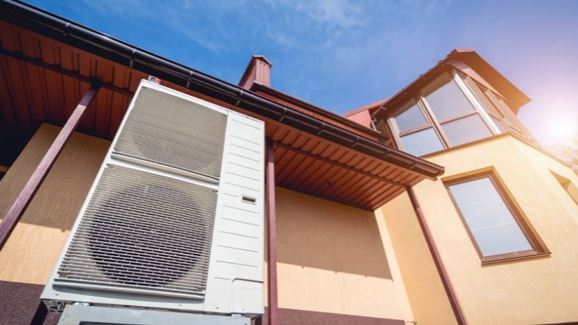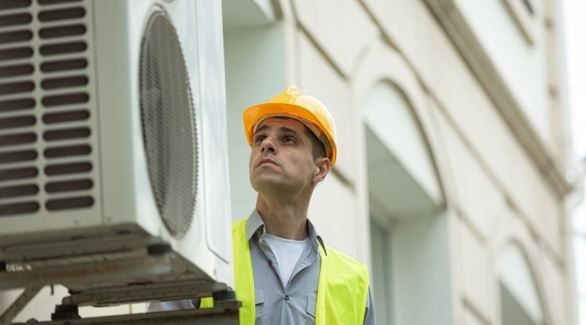Entrepreneurs are increasingly choosing to heat their buildings with heat pumps. This solution allows them to significantly reduce their bills and at the same time build the image of ecological and socially responsible companies. However, many entities are still refraining from making a decision. The main reason for their doubts are the high investment costs associated with the heat pump. In our guide, we will try to answer the question whether it is worth it.
From this article you will learn:
- what are the main advantages and disadvantages of heat pumps,
- what determines the investment and operating costs of heat pumps,
- When is it worth investing in a heat pump?
How does a heat pump work?
A heat pump is an efficient device that extracts heat energy from the building's surroundings. Then, using electricity, it is used to heat rooms or prepare hot water. In summer, it can be used for cooling. The pump itself is an element of a larger heating system, which also includes a lower source (air, ground or water) and an upper source, i.e. the heating installation in the building (usually surface heating).
Check out heat pumps in Onninen
 The main advantage of a heat pump is the savings on fuel. The device uses renewable energy sources, the processing of which requires only a relatively small amount of electricity. Its cost is actually the only expense of the investor at the stage of system operation. The biggest disadvantage of this solution is the high price of purchasing and installing a heat pump.
The main advantage of a heat pump is the savings on fuel. The device uses renewable energy sources, the processing of which requires only a relatively small amount of electricity. Its cost is actually the only expense of the investor at the stage of system operation. The biggest disadvantage of this solution is the high price of purchasing and installing a heat pump.
It is therefore not surprising that investors try to answer the question of how long it will take to pay off the investment in a heat pump. In this case, it all depends on how much the company pays for traditional heating and what type of device it intends to install.
How much does a heat pump cost?
The cost of purchasing and installing a heat pump depends on several important factors. A wide range of different solutions allows you to tailor your choice to the individual needs and possibilities of investors. The aspects that have the greatest impact on the prices of heat pumps include:
- type of ground source (determining the type of heat pump),
- device parameters (mainly power and amount of consumed electricity),
- type of upper source (floor, wall or radiator heating),
- building area,
- heat pump manufacturer.
Taking into account the above criteria, it can be concluded that the cost of investing in a heat pump ranges from:
- 35 - 40 thousand PLN in the case of an air-water heat pump (for a building with an area of 150 m 2 ),
- 50 - 80 thousand PLN in the case of a ground heat pump (for a building with an area of 150 m 2 ).
A ground source heat pump will turn out to be much more expensive, not so much because of the price of the device, but because of the costs of its installation. Due to the much lower susceptibility to ambient temperature fluctuations, its operation will be noticeably cheaper than in the case of an air heat pump. Taking into account current electricity prices, it is estimated that heating with a heat pump costs on average:
- PLN 2,940 in the case of an air heat pump (for a building with an area of 150 m 2 and a demand of 100 kWh/m 2 /year),
- PLN 2,475 in the case of a ground heat pump (for a building with an area of 150 m 2 and a demand of 100 kWh/m 2 /year).
These amounts are significantly lower than the expenses for heating the building using traditional methods. Assuming the same variables regarding the specificity of the facility, the prices are as follows:
- PLN 4,378 in the case of natural gas heating,
- PLN 4,714 in the case of coal heating,
- PLN 5,475 in the case of pellet heating,
- PLN 6,788 in the case of heating with fuel oil,
- PLN 10,000 in the case of electric heating.
Moreover, we are currently dealing with rapid increases in prices of all the types of fuel mentioned above. Therefore, it is expected that the costs of heating the building will continue to increase. Investing in an air heat pump, and even more so in a ground pump, can significantly reduce the bills of any company. The more you currently spend on heating your company's headquarters, the faster your investment in this modern heating system will pay off.
Advantages and disadvantages of a heat pump
 Savings associated with a heat pump take many forms. The exceptionally low cost of operating the device is just one of them. You will notice others even during the construction stage of the facility. The investor may, for example, decide not to build a chimney or a place to store fuel. It is also worth mentioning the safety of use of heat pumps and their maintenance-free operation.
Savings associated with a heat pump take many forms. The exceptionally low cost of operating the device is just one of them. You will notice others even during the construction stage of the facility. The investor may, for example, decide not to build a chimney or a place to store fuel. It is also worth mentioning the safety of use of heat pumps and their maintenance-free operation.
However, when planning an investment in a heat pump, the disadvantages of such a solution cannot be underestimated. Of course, this is about the already mentioned installation costs, but not only that. Depending on the type of device selected, you have to face challenges such as supplementing the heating system with an additional heat source or invasive installation. Air-source heat pumps cannot work independently in our climate, and ground-source heat pumps take up a lot of space on the plot.
Therefore, every investor should carefully consider investing in a heat pump before making such a decision. If in your case the benefits of this solution outweigh the potential losses, a heat pump may be a good idea. Otherwise, consider alternative ways to heat your business premises.
Is a heat pump profitable?
Knowing your current expenses for heating the building, as well as its heat demand, you can easily calculate whether a heat pump will be a profitable investment in your case. Take into account that the cost of its operation can be further reduced by installing photovoltaic panels. They will provide you with free energy to power the pump. Also take an interest in various renewable energy subsidy programs intended for entrepreneurs. You may be able to take advantage of an attractive loan or subsidy.
Exchange benefits in the new OnnTop loyalty platform!
To make the investment in a heat pump profitable for you, you must first of all select its parameters appropriately to your needs and the specificity of the building. Start by deciding on the type of device. If your facility is located on a large enough plot and you do not care about its development in any other way, the most advantageous solution will be the purchase and installation of a ground heat pump. However, if you are only planning a minimally invasive modernization of your current heating installation, an air-to-water heat pump will be the optimal choice.
When choosing a heat pump, also consider:
- thermal demand of the building (which is influenced, among others, by the climate zone and the quality of the building's insulation),
- bivalent temperature (at which the heat pump starts to be supported by an additional source),
- external daily temperature,
- temperature of the upper heat source and parameters of the heating installation,
- device operation chart.
